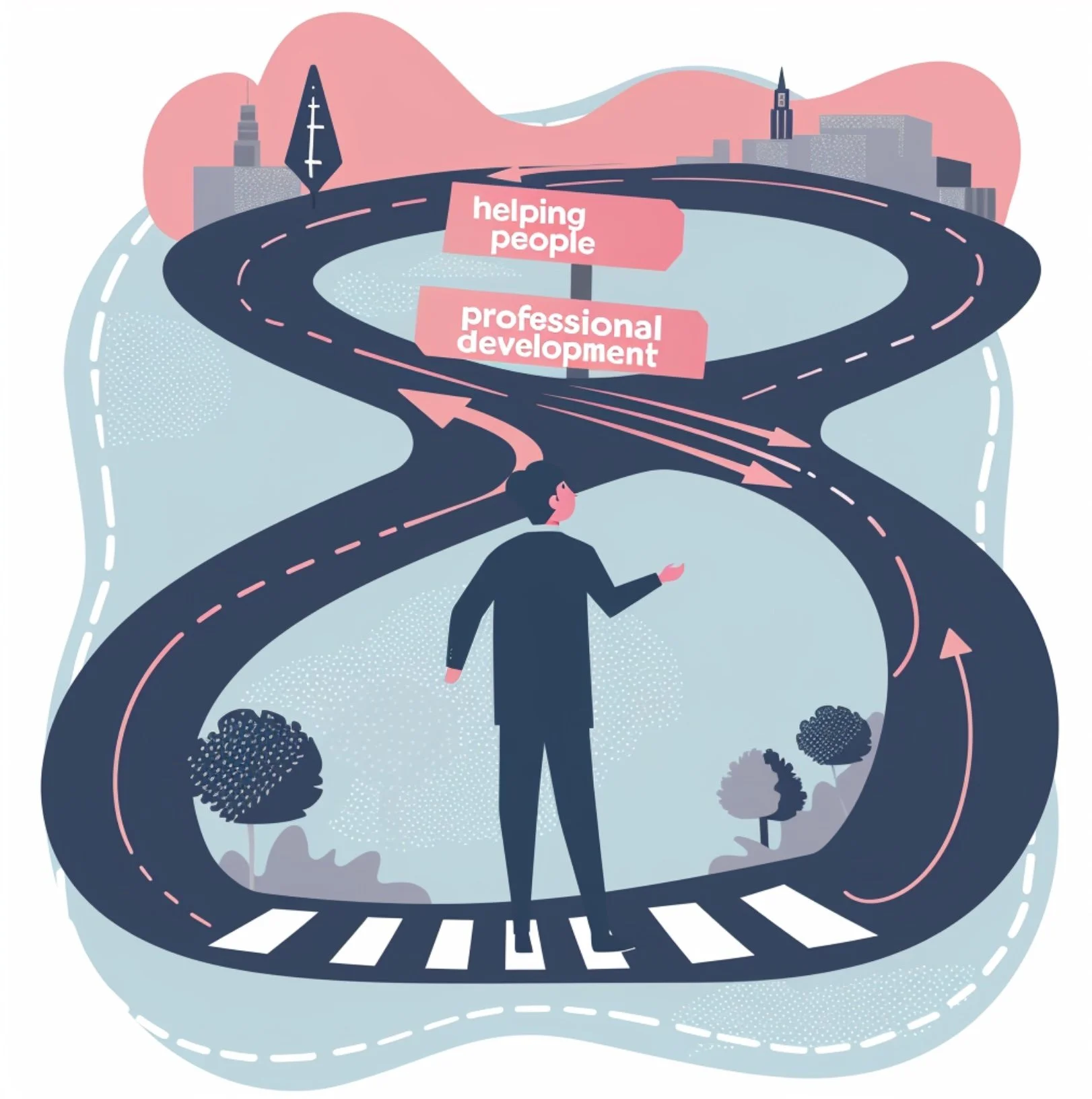
Take Your Future Impact Into Account
Written October 14 2024
Est. 9-10 minute read
This article draws heavily from Probably Good (see their up-to-date entry here).
Where do you see yourself in 5 years?
It’s a common interview question, usually answered with a polite but vague response that aligns with whatever job you’re applying for. But if you really think about it, do you have an idea of what your career will look like in 5 years? How about 20?
Most people don’t. Instead, they take whatever opportunity sounds best at the moment without putting much thought into where it will lead. This isn’t always a bad approach. But if you want to help others, it’s important to think about what kinds of jobs and opportunities will put you in a good position to make an impact in the future. Why?
For one thing, people often hit their peak productivity in their 40’s and 50’s. This means the later years of your career are some of the most valuable. Second, if you start investing in your experience and skills early on, you will have a lot more time left to do great work.
Most importantly, you can’t help the causes or organizations you care about if you don’t contribute something they need. It takes time to gain experience and expertise. By thinking about job opportunities in the context of your entire career, you can open yourself to opportunities that make a greater impact later on.
So how do you take your future impact into account? One thing you can do is focus on opportunities that build up your “career capital.”
Career capital refers to the abilities and resources that allow you to do more with your career in the future. These could be specific skills, credentials, financial resources, knowledge, or connections. It’s obvious that these kinds of resources could help you achieve professional goals, but they can also help you achieve a larger social impact. This is because the expertise, experience, and influence you have can vastly increase your contribution to the causes you believe in.
Though relevant at any stage, building up career capital is one of the best things you can do early on in your career. Here are a few nuances when thinking about career capital to keep in mind.
Consider potential tradeoffs in impact
One thing to consider when building career capital for your future impact is the potential tradeoff against your current impact.
For example, a recent grad may choose whatever available job seems to help the most people, such as an entry-level job at a nonprofit. But because the nonprofit is focused on reducing overhead costs and doesn’t invest much of its resources into mentorship or development, it’s difficult for entry-level employees to move into higher positions. Instead, they’re reserved for external hires with a lot of experience and professional development—leaving early-career employees without the training and career capital they could have received elsewhere.
This sort of thing doesn’t happen at every nonprofit, but it does illustrate the importance of weighing career capital alongside impact. The tradeoff isn’t always zero-sum, and some roles enable you to build career capital and help others at the same time. But early on in your career, it could be a good idea to focus on whatever opportunities would give you useful skills, connections, and experience—even if it’s not world-changing to start with. This could position you to make an even bigger difference later in your career, such as founding a think tank.
However, if you’re already in the later stages of your career, it’s likely that you already have a significant amount of experience, training, and connections. As a result, it could make more sense to apply the experience you’ve gained so far to the most impactful opportunity you can find.
Investigate what kind of career capital will be relevant
It’s important to have a good understanding of what specific kind of career capital is critical for the path you want to pursue.
If you plan on entering a competitive, niche, or complex field (say, in academic research or senior policy work), it might be necessary to build up highly specialized career capital. This often involves gaining experience and networks in the specific domain you’re interested in.
One caveat to keep in mind is that not all career capital is useful or worth the time it takes to build. Taking on a role that requires significant investment (either into developing your skill set or financing your education) may have a higher opportunity cost than it’s worth. While it could yield promising long-term returns, they’re not guaranteed.
If you’re not sure about your career plan or what direction you’ll take, ensuring your career capital is flexible can be more important than ensuring it’s tailored to your current plan. Flexible career capital includes skills or experiences that could be applied to several fields—like management, quantitative skills, interpersonal communication, project management, operations, connections to successful individuals, etc.
To better understand what kind of career capital you should focus on, try to figure out what skills and qualifications are more important for the options you might pursue. For instance, does this career path require a specific educational background to get into the field? A particular skill set? Our in-depth career profiles include research on the needed skills and experience for a variety of career paths, and a bit of online research could help you answer this for others.
Sustain your motivation to help others
The people you spend time around can profoundly shape your identity and motivations, especially when you walk alongside them day after day. And if you spend years building career capital in a field or job that isn’t aligned with serving others—hoping to make a positive impact later on—it’s all too easy to let your values drift over time, often without realizing it.
You may begin with a heart full of purpose, yearning to make the world a better place. Perhaps you take a corporate job, intending to gain influence and experience. But as the years go by, the pursuit of promotions can quietly become your new compass. You start measuring your worth by your position on the corporate ladder, and before long, you might convince yourself that this climb is not just necessary—but the best way to make a difference. And let’s not forget, stepping away from that cushy executive role could disrupt the lifestyle you and your family have come to enjoy.
The warning is clear: No matter how strong your original values, it’s dangerously easy to let them slip when you’re caught in the inertia of worldly success.
Scripture warns us about this drift. "For what will it profit a man if he gains the whole world, and forfeits his soul?"(Mark 8:36). This isn’t just about wealth or status—it’s about our hearts, our purpose, and who we become along the way. We must stay vigilant, lest we lose sight of the mission God placed in our hearts, trading eternal significance for fleeting success.
The moral is simple: Stay grounded in your values and keep your eyes fixed on your true calling, for it's all too easy to be swept away by the currents of ambition. If we lose sight of the higher purpose we were meant to serve, we risk forfeiting the very soul of our work—and perhaps, our lives.
To reduce this chance, consider ways you can commit to your values and sustain motivation. For instance, you could volunteer for a cause you find important. If you’re earning a lot of money while building career capital, you can also earn to give and stay connected to the communities you’re helping by deeply engaging with your donation decisions.
Plan ahead—but don’t plan everything
Taking your future impact into account (by building career capital) can enable you to make a much bigger impact throughout your entire career. However, it’s important to strike a balance between over- and under-planning, both of which can be mistakes.
Career capital is all about putting yourself in the position to have more opportunities. It’s important, then, to seize opportunities that could be promising—even if they don’t quite fit your pre-planned ideas about your career.
Summing Up
Taking your future impact into account means:
Having a long-term vision
Building career capital by acquiring skills, experience, and connections
Being open to unexpected opportunities
Weighing up immediate job impacts against longer-term career development
Need help discerning your career? Sign up for our free one-on-one impact mentorship here.
To read more about it click here.
Do you have any career uncertainties? Click here to read our article on three big career uncertainties you can trust God with.




